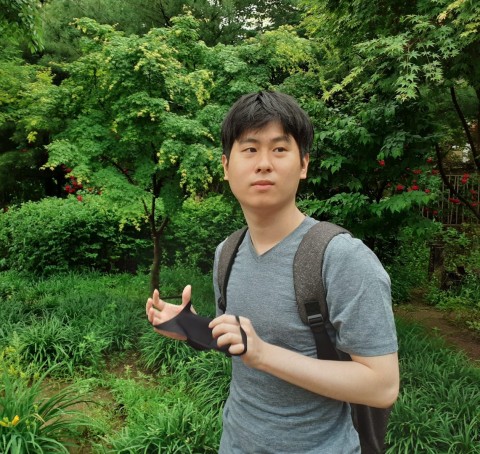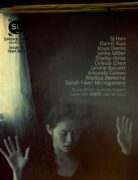I enjoyed the repetition of “At dusk” in this piece. I felt it was useful for grounding the future tense and helping to frame the narrative. Did you have a specific reason for picking dusk as opposed to a different time of day?
Here’s the story: There’s an apartment complex that I cut through when I walk home, and there’s this small plaza in the middle of it. It’s usually just an empty, awkwardly shaped stretch of concrete. But just once, I was walking home at night and saw a father and son playing badminton in the plaza, and I thought it was such a precious moment. I suddenly wanted to write a character that could experience that too—getting to play badminton with their dad at night.
So I had this scene I knew I wanted to write, but at the time, I didn’t know the story that it belonged to. What I usually do when I’m stuck like this is to pair the scene I have in mind with a seemingly unrelated idea—like a DIY writing prompt. At the time, my mind was on the spontaneous violence going on in the world, all the ugliness on the news—and I ended up with this mental image of a person knocked down to the asphalt. From there, I tried to lace these two distinct images into a story, and nighttime—with its ability to be both beautiful and frightening—became the connective tissue.
What were your motivations for choosing to tell this story using the future tense?
To be honest, it started with a hunch that this story might end up better in future tense. The sentences just sounded better in my head, I guess.
As I went through different drafts and received feedback, though, I realized I could draw something more out of the tense, to give it more of a purpose. There was this potentiality of events that I could be getting at, I noticed—this sense that any number of things could happen, but only a small number of things actually do happen.
That’s actually when I thought of incorporating fate in this story. The father’s remark on destiny being strange—that was one of the last sentences I added to this story. So in this case, the form informed the content rather than the other way around. I guess for me, the takeaway is this: Jump outside the comfort zone and figure out what’s nice about being out of the comfort zone. It doesn’t always matter which of the two happens first.
There are parallels between how important people in the narrator’s life are described to the reader. When we first meet the narrator’s father, we’re in Seoul and see “skyscrapers puncturing the darkness with glass teeth, a hue of amber glossing my father’s freckled face.” When we meet the narrator’s future love, we’re in the U.S. and see “the dim lights on her face stirring as she gnaws on a whiskey-soaked ice cube.” This latter description is part of a larger scene that seems to mark a turning point in the story, where the narrator begins to feel more at home in a new place. Were these parallels intentional? Do you think home is a person or a place to this narrator?
I’m speaking more on behalf of myself than the narrator, but I think a home is more than a person or place—a home is a hub of memory, a reminder of the stories you’ve been a part of. And to render a story, people and place are both necessary.
I think for the narrator though, the people side of the equation is more on their mind. The narrator is attentive of details like the lighting because the lighting affects how their father’s or lover’s face looks in the moment. So place is important in situating loved ones in memory, and to an extent, the narrator intuitively understands that too, even though they might not fully acknowledge it.
I found this line especially memorable: “… just once she will flinch at the sight of my shadow behind hers.” The narrator is walking a woman home, hyperaware of potential threats, only to discover that, for a brief second, they are the threat. What were you trying to convey with this interaction?
It’s definitely a jarring moment for the protagonist. The protagonist has developed this fear of strangers at night, and rightly so, but they’re in no way alone in that uneasiness. I think the protagonist had to face that reality at some point.
Also, to establish an overall sense of danger in the middle of the piece, fear had to manifest itself in more than one way. In this story, the protagonist is hard to picture, being both ungendered and unseen (in that the “camera” is never placed on them). To then shift to a frightening moment for a character who is explicitly a woman, the fear becomes something almost realer, even though it’s brief and deprived of the sort of internal reaction afforded to a narrator.
We know the narrator’s father believes in destiny. Does the narrator? What do they think destiny has in store for them?
I can’t say whether the narrator believes in destiny, but I’d like to think that they don’t wholly care, that they see the beauty in either destiny or coincidence. They might believe that even if everything in life happens by chance, you and every person that’s ever been important to you have crossed paths against staggeringly low odds—with the sprawl of millennia and the vastness of a planet both conspiring against you. And that’s meaningful in its own way.
Looking forward, the narrator doesn’t know what’s next, but they’re cautiously optimistic for whatever is to come. I think they’d be right to think so.



 The core workshop of SmokeLong Fitness is all in writing, so you can take part from anywhere at anytime. We are excited about creating a supportive, consistent and structured environment for flash writers to work on their craft in a community. We are thrilled and proud to say that our workshop participants have won, placed, or been listed in every major flash competition. Community works.
The core workshop of SmokeLong Fitness is all in writing, so you can take part from anywhere at anytime. We are excited about creating a supportive, consistent and structured environment for flash writers to work on their craft in a community. We are thrilled and proud to say that our workshop participants have won, placed, or been listed in every major flash competition. Community works.